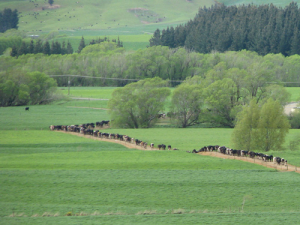Wired for Science: Understanding the feeding habits of mealybug
Fussy children might be frustrating, but fussy mealybugs could help protect the New Zealand wine industry from grapevine leafroll-associated virus 3.
 Hafiz M. Abrar Ilyas is comparing the difference between Pastoral Dairy Farms and Confined Animal Feeding Operations dairy systems in terms of energy consumption and environmental emissions.
Hafiz M. Abrar Ilyas is comparing the difference between Pastoral Dairy Farms and Confined Animal Feeding Operations dairy systems in terms of energy consumption and environmental emissions.
A Lincoln University PhD student is putting New Zealand’s vaunted paddock-based dairy industry to the test.
Hafiz M. Abrar Ilyas is comparing the difference between Pastoral Dairy Farms (PDFs) and Confined Animal Feeding Operations (CAFOs) dairy systems in terms of energy consumption and environmental emissions.
He says it is something that has not been done before but needs to be looked at if New Zealand is to take its environmental responsibilities seriously.
“Pastoral Dairy Farming Systems are common in New Zealand while the CAFO system is relatively new, but increasing in numbers especially in the South Island,” he says.
“The core advantage of using CAFOs system is that they have minimum soil disturbance, have more control over climate events and research has shown they can achieve higher milk production per cow.”
However, are they more energy efficient and able to reduce emissions?
A direct comparison will let the numbers speak for themselves.
“The intensification of New Zealand’s dairy industry, including its vertical and horizontal expansion could cause serious environmental issues,” Ilyas says.
New Zealand’s agriculture sector produces 46% of its greenhouse gas emissions, according to a 2014 Ministry for the Environment report.
Dedicated efforts and studies are required to look into the environmental impact the dairy industry is having on New Zealand, he says.
“The findings of this study can be useful for making environmental policy regarding NZ dairy production systems as well as help farmers in selecting appropriate farm management practices for the sustainability of the New Zealand dairy industry."
A qualified engineer, he is being supervised by Dr Majeed Safa and Professor Alison Bailey and will be surveying farmers using both systems, and hopes to have results in June, 2017.
Mating wrapped up last month at the across-breed Beef Progeny Test on Pāmu’s Kepler Farm in Manapouri.
Libby Judson is a keeper of memories from an age gone by. Tim Fulton tells her story.
A New Zealand-first native tree study has highlighted the Bioeconomy Science Institute's position as a forestry research leader.
Hemp fibre processor Rubisco is relocating its core processing facility to Ashburton as part of a $20-$30 million expansion to leverage what it says is an accelerating global demand for sustainable and renewable fibres.
Tradition meets some of the latest in technology at the 2026 East Coast Farming Expo.
OPINION: Trade Minister Todd McClay and the trade negotiator in government have presented Kiwis with an amazing gift for 2026 - a long awaited and critical free trade deal with India.